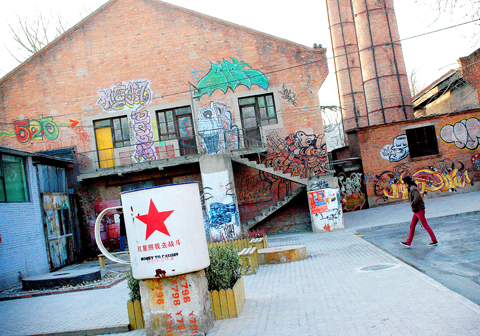Art markets around the world have taken a hit from the global financial crisis and, analysts said, it could very well lead to a correction for the star performer: contemporary Chinese art.
After a stellar period that began less than a decade ago and made previously unknown artists famous virtually overnight, a less exuberant mood is now spreading — and, some say, that may actually be good.
“Perhaps we will witness a healthy correction,” said Berenice Angremy, the director of Thinking Hands, an organization in Beijing’s 798 art district that specializes in cultural events.

PHOTO: AFP
In Hong Kong, bids at auction houses Christie’s and Sotheby’s are disappointingly low, while in China galleries close down, leading to the question: Is the bubble about to burst?
“The market for contemporary Chinese art has seen unprecedented growth in the past five years — from US$3 million in 2004 to US$194 million in 2007,” said Evelyn Lin (林家如), a Sotheby’s executive. “So it wouldn’t be surprising if it started stabilizing a bit.”
In Beijing, Poly Auction (保利國際拍賣) has felt the impact of the crisis, too, and has had to adjust its prices accordingly.
“On average prices have gone down. But good artists can still get good prices for good works,” said Xu Juan (徐娟), director of Poly Auction’s international department.
For example, when Xu auctioned off a painting by celebrity artist Zeng Fanzhi (曾凡志) early last month, he managed to sell it for US$900,000.
But of course, this was not particularly astonishing for an artist whose painting Mask Series 1996 No 6 sold for close to US$10 million when put on the block by Christie’s in Hong Kong in May.
It was a record for contemporary Chinese art, and it was almost matched one month later, when a canvas by Liu Xiaodong (劉曉東) fetched US$7.95 million at Sotheby’s in Hong Kong.
But, market insiders say, the infatuation with Chinese art led to a large number of artists attempting to establish their commercial value with worn-out imagery from the Cultural Revolution or pop-art motifs that had long since lost their novelty value.
“There have been lots of copies, and a sort of avant-garde art that has been outdated in the west for 30 or 40 years,” a Hong Kong-based art agent said.
“The prices were exaggerated. Young artists, still in school, were selling their paintings for US$100,000,” a gallery manager at 798 said. “It had lost touch with reality. The crisis will put this straight.”
The past five or six years marked a regular boom, and it was not always healthy, Angremy said.
“There have been some true artists, excellent artists, but there has also been a lot of excess and speculation,” she said.
“More and more people have suspected the artists and their galleries of buying their own art to make sure the prices didn’t fall. Even if this practice is not unique to China, it may be more widespread here than elsewhere,” she said.
Meg Maggio, manager of Beijing Fine Arts in Caochangdi, another Beijing art district, agreed that the crisis could help rid the Chinese art market of some of its less savory characteristics.
“In the end, the Chinese market will do well. It will emerge healthier and more locally focused,” she said.
“It is to be hoped that in the coming months the salons and galleries will become less commercial, more experimental and, in the final analysis, more exciting for the public and the collectors,” she said.

Quanta Computer Inc (廣達) chairman Barry Lam (林百里) is expected to share his views about the artificial intelligence (AI) industry’s prospects during his speech at the company’s 37th anniversary ceremony, as AI servers have become a new growth engine for the equipment manufacturing service provider. Lam’s speech is much anticipated, as Quanta has risen as one of the world’s major AI server suppliers. The company reported a 30 percent year-on-year growth in consolidated revenue to NT$1.41 trillion (US$43.35 billion) last year, thanks to fast-growing demand for servers, especially those with AI capabilities. The company told investors in November last year that

Intel Corp has named Tasha Chuang (莊蓓瑜) to lead Intel Taiwan in a bid to reinforce relations between the company and its Taiwanese partners. The appointment of Chuang as general manager for Intel Taiwan takes effect on Thursday, the firm said in a statement yesterday. Chuang is to lead her team in Taiwan to pursue product development and sales growth in an effort to reinforce the company’s ties with its partners and clients, Intel said. Chuang was previously in charge of managing Intel’s ties with leading Taiwanese PC brand Asustek Computer Inc (華碩), which included helping Asustek strengthen its global businesses, the company

Taiwanese suppliers to Taiwan Semiconductor Manufacturing Co. (TSMC, 台積電) are expected to follow the contract chipmaker’s step to invest in the US, but their relocation may be seven to eight years away, Minister of Economic Affairs J.W. Kuo (郭智輝) said yesterday. When asked by opposition Chinese Nationalist Party (KMT) Legislator Niu Hsu-ting (牛煦庭) in the legislature about growing concerns that TSMC’s huge investments in the US will prompt its suppliers to follow suit, Kuo said based on the chipmaker’s current limited production volume, it is unlikely to lead its supply chain to go there for now. “Unless TSMC completes its planned six

TikTok abounds with viral videos accusing prestigious brands of secretly manufacturing luxury goods in China so they can be sold at cut prices. However, while these “revelations” are spurious, behind them lurks a well-oiled machine for selling counterfeit goods that is making the most of the confusion surrounding trade tariffs. Chinese content creators who portray themselves as workers or subcontractors in the luxury goods business claim that Beijing has lifted confidentiality clauses on local subcontractors as a way to respond to the huge hike in customs duties imposed on China by US President Donald Trump. They say this Chinese decision, of which Agence